- Home
- Andrew Wareham
Dark Days Of Summer (Innocents At War Series, Book 4) Page 11
Dark Days Of Summer (Innocents At War Series, Book 4) Read online
Page 11
“I will deal with the matter, sir,” Baring interposed before Trenchard could commit himself to any extreme.
Baring shepherded them out and into his own office, made the first of his telephone calls to the Engineers, arranging an appointment to speak to the highest-ranking officer he could get hold of.
“Five o’clock this evening – not at all bad, Tommy. Now, what’s this about the Intelligence Officer?”
“He needs an office, a sergeant and two enlisted men, for a start. The look in his eye said more to come. He is on his way to complain to you because I can allow him the office only. I don’t have spare bodies, Maurice, and if I had, there are other priorities for them. He probably won’t be here today, by the way, due to his accidentally boarding a tender bound for Calais.”
“’Accident’, Tommy?”
“Must have been – he obviously did not want to go to Calais.”
“Did he not ask the driver where he was bound?”
“No – just out from London, never been in France before. I expect he thought he was getting on one of their omnibuses.”
“Go back to St Michel, Tommy. I will deal with everything, as quickly as I can. When can you start flying?”
“Not until the mechanics are ready, Maurice. They must have their workshops or they cannot get us into the air. Baldy Ross says he needs hard bases for his machines – I can’t remember exactly what he’s got – milling and lathes and drills, and probably a machine-saw for the riggers. A machine saw and a stack of timber and they can rebuild a wing far quicker than sending a machine back by truck to the Aircraft Park or to England.”
“As I remember, Tommy, the workshops are equipped entirely with hand tools…”
“Probably, sir. Baldy is a remarkable hand at scrounging, I believe, and one of the best at keeping planes in the air. You know the difficulty of getting hold of spares just when you need them – he makes his own as often as not, and better than the ones from the factory. Add to that, if other squadrons need parts, they know where to come. You know the level of wastage through wear and tear, sir.”
“Twenty-five per cent per month, Tommy. At any given moment one in four of machines is grounded and more than half of the machines sent out from England are used simply to replace breakdowns.”
“He kept the old RE7s down to half of that – I cannot remember ever having more than two down from sixteen. The Strutters are doing equally well. I have been able to put twelve in the air without fail, and have at least one spare. While he does that, he can steal anything he wants!”
“Didn’t hear it; don’t know it. You will get your concrete floors, Tommy. Within a very few days, whatever I have to promise. Did you bring any booze out from England? A carton of malt will generate an awful lot of favours.”
“Officially, Maurice, most definitely not. I will pass the word round. The bomb carriers hold one hundred and thirty-four pounds weight. If some – or all – of them were not filled with something useful, I shall be amazed.”
“I’ll organise that,” Jim interposed. “Far better that the pilots think they’ve put one over you, Tommy, that you know nothing. I’ll have a delivery set up by tomorrow morning.”
The field was located on heavy clay, and flooded within minutes of rain starting to fall. Jim, an agriculturalist from the Hampshire Basin, was familiar with the problem.
“Ditches, Tommy, a yard wide and four feet deep and no more than thirty yards apart, and you can have very good land for potato growing. Cabbages do well, and peas and beans.”
“Interesting information, Jim. What of aeroplanes?”
“Not so good for them, unless you have a very short take off. Slightly more practically, you could put heavy boards across the ditches, sort of bridges. Better still would be to put the field up on the chalk ridges behind us – but they are wavy in shape, you can’t get a straight hundred yards on them. A covering of gravel and cinders might make a usable track for landing and take offs, but I wouldn’t guarantee it. The best thing is not to have a field here.”
“Boom wants this location – close to the Trenches; near to the big road leading up from Calais; ten minutes from the railhead. Got a lot going for it. Except that it’s no bloody use for flying.”
“I’ll take a look around, Tommy. We might be able to persuade him that we have a better location.”
Two days suggested that there were any number of better places to site an airfield, but all had been taken by the Army. They were stuck at St Michel.
The pilots sat in the mess tent and moaned, and drank and argued with each other. Tommy fretted.
The Engineers arrived in a bright dawn, descending on the field en masse, an unending stream of trucks and carts and horses and wagons pulled by traction engines. An hour later a line of Chinese labourers marched in, four abreast, bearing mattocks and shovels on their shoulders; at least a thousand of them were ranged in lines and began to dig.
Tommy stood open-mouthed, fascinated; he loved the sight of other men performing manual labour.
“You know, Jim, every time I see men digging, I think how lucky I am to be a pilot. I do all my work sat on my backside, and rarely as much as four hours a day of it. Even when the Big Push comes we won’t actually be more than ten hours in the air in any day, and that for two or maybe three days at most – I hope. Flying is so much better than working for a living!”
“Don’t see many coolies shot down in flames, Tommy.”
That, Tommy was forced to concede, was a point.
A captain came wandering across to them, asked where they wanted things to be put.
“In what way, exactly?”
“We are to erect hangars and workshops, sir, first. Then accommodation and a vehicle park. While we are doing that, we are to dig drains and try to give you a dry landing strip of about two hundred yards long and as wide as we can. Where, sir?”
“Not my area of knowledge, but I can find out very quickly. Jim, can you call Captain Ross over?”
Tommy turned back to the captain.
“Sorry, old chap, I didn’t catch your name and unit.”
“Marks, sir. Seventh Pioneer Battalion. They sometimes call us Labour Battalions, sir; the new ones are getting that name. Most of my men are skilled tradesmen, sir – masons and carpenters and blacksmiths and the like from the building trades. Not, sir, to be confused with the new Non-Combatant Companies, sir!”
“I had not heard of them, Captain Marks.”
“Conshies, sir! Conscripts who refuse to fight on moral grounds, sir.”
“Conscientious Objectors,” Jim murmured.
“Oh! Them! Quite right that your men don’t want to be confused with them, Captain Marks! Here’s Captain Ross now. He is in charge of the hangars and of all of the mechanics and knows his machines, Captain Marks.”
Baldy Ross had a sheet of paper in his hand – a plan of the field, no less.
“Take off strip to run south-westerly, Captain Marks – wind is most commonly out of the southwest. Hangars here, alongside the track running in. Concrete bases as big as you can make ‘em. If you can give us a hard apron outside the hangars, it will be useful. Ammunition store not too far distant – dry base and masonry walls to ten feet, if you can, good and thick. Bomb dump at a distance, with its earth bank of course. Petrol in the other direction; protected again. Messes and living quarters as far down this track as we can get; the mechanics will be running engines most nights and the pilots want their sleep. There’s a stream a couple of furlongs distant, and I imagine the land slopes down to it, so I’ve pencilled the buildings as much as possible upslope.”
Captain Marks took out thick spectacles and looked at the plan, asked a couple of questions and then called a pair of sergeants across, showed them what was wanted and told them to get on with it.
“Master builders both, Major. Brickies and groundworkers, able to set out any site. They will have the footings pegged out within the hour and will be laying concrete before the day’s out. I�
��ll get the Chinks busy on the landing strip just as soon as they have dug a first long ditch down the side of the field. They’ll put it in the right place themselves – they’ll watch how the water runs and will get the drainage working, no sweat. Good workers – rice and half a pound of corned beef a day and whatever greens we can find them, and a dry place to lay their heads, and most of them say they’re better off than ever they were back at home. Come the end of the war, sir, and they won’t be going back to the Orient, not if they can avoid it.”
“How long will the job take, Captain Marks?”
“Depends, sir. Dry weather and the hangars will be up in four days. The carpenters will get the huts up for living quarters in that time. Kitchens will take just two days – easy to build them, they’re no more than big open rooms. Ablutions, they need more by way of drainage and could take longest; we’ll need a bloody great big septic tank. Bit of luck, we’ll have the basics up in a week. The landing field is the problem, of course. Your boss at Headquarters wants a field that will be usable in winter. He says that last winter there were weeks when the mud was so thick that the planes couldn’t get off the ground. I’m going to try cutting a bit of a hole, no more than two feet deep, and filling it with cinder, say forty-foot-wide and a furlong at least, see if that will do the trick. Might not. Might be that we would need a layer of hardcore, broken bricks, underneath; plenty of them about, any number of pulverised villages hereabouts. Never done it before, so we don’t know. Could be that we might have to build something like the permanent way of a railway track. See what happens, sir.”
“But you think we might be able to fly within a week.”
“With luck, sir.”
“Very good. Jim, do you think we might be able to go to the seaside?”
“Pilots and observers, sir? Why not?”
They set off next day, all in holiday mood, ready to drink too much beer, eat strange food and lie out in the sun, if there was any.
Dark Days Of Summer
Chapter Five
The squadron returned after four days on the coast, replete with sand and sea, and having had a jolly good time, they all agreed. They would have stayed away longer if they had not run out of francs.
Tommy discovered he had an office now, Jim next door and the Flight Commanders in a tidy row beside them. They were smallish wooden huts; they smelt of paint and varnish and the flat roofs looked rather flimsy, but they were better than tents.
Captain Marks had completed the rooms for the officers and observers, as well as the all-important Messes for officers and sergeants, and the barracks huts and mess halls were due for the end of the day. He was very pleased with his kitchens which had coal stoves and light from an electric generator, conveniently run off a petrol motor, fuel scrounged from the hangars.
The hangars were within a day of readiness and Baldy Ross was busily installing his machines on their solid and perfectly level bases.
The drainage ditch was complete and full of water, which was busily running away to the nearby stream.
The work was, in fact, close to completion, with the exception of the landing field.
“Brilliant job, Captain Marks, everything an airfield should be, apart from somewhere for the planes to take off and land. Not wishing to be offensive, old boy, nor to ask awkward and tactless questions, but the planes are rather important to us, you know.”
Captain Marks waved a hand towards his busy Chinese labourers.
“Had to dig a bit deeper than I had allowed for, Major Stark. Thick layer of topsoil here, in fact. Unusual. That meant we had to get in more in the way of clinker than I expected – quite a few more loads. Because of its depth, we had to roll the clinker, to settle it firmly. Got a steamroller… one of the heaviest sort, as a matter of fact. You can see it over there.”
Tommy followed the pointing finger to another very busy group of coolies, saw a tilting smokestack in their middle.
“Parked it overnight on softish ground, foolish chap! Sure we shall dig it out soon.”
“Did he manage to roll the clinker first?”
“Some of it. Quite a lot, in fact. Do the rest tomorrow. Using a traction engine for the while – narrower wheels of course, so it takes a lot longer. Two more dry days and you will have your landing track, sir. Building the storage points now, sir. Petrol and ammunition and bombs, all properly separate and protected. Due to get your deliveries in three days, sir, and all will be ready for them.”
“Very good, Captain Marks. I am amazed, and very much impressed by all you have done. Kitchens, mess halls, barracks, accommodation for the observers and pilots – all seem outstanding to me, sir. I shall make very sure that the message goes to the right places, be sure of that, you can expect RFC headquarters to be mentioning your name very favourably. If you find yourself with any spare clinker, can you drop some onto the road leading in, do you think? I have a feeling that winter will see that road full of mud and potholes. Do you drink, by the way?”
Captain Marks laughed, said he had whisky sufficient to keep him unsober till Christmas.
“Your Adjutant, sir, has been more than generous. He has managed to drop a bottle to each of my sergeants, too, and barrels of beer to the tradesmen. He has even found some extras for the Chinese, tins of meat and bottles of beer – which they very much appreciated, I should say. Not used to being given little bonuses, the Chinese lads, and touched to their hearts by the kindness. Rough life those poor sods live, and they tell me it’s better here than in China itself; not one died of starvation since they signed on, though we have lost a good few to pneumonia and such, their living quarters being less than perfect!”
“Be thankful for small mercies, so they say, Captain Marks. I wonder about this world sometimes, you know. After the war, I might even ask some questions about the way we treat these poor fellows. But not now; first things first. Operational in three days, you think? I shall telephone Headquarters with that message. A thought has just struck me, Captain Marks – we are supposed to have a colonel and his staff coming here. Have you been told to do anything for them?”
Captain Marks knew nothing of colonels.
“You will probably get a message from your people later today.”
“I shall place them appropriately, Major Stark, at the bottom of the slope where they will get first benefit of the rain and mud. It won’t matter to them, of course, because colonels never do anything useful.”
Tommy gravely agreed.
Tommy took first flight off the clinker track, was amazed at the experience of rolling along an even surface. It was very strange not to bounce over tufts of grass, to have no need to correct his course every two or three yards. He wondered if he would slow down as rapidly on landing – the grass must play a part in gripping the wheels, he suspected.
He came back down and discovered that he took another ten yards on the ground, but that was of little importance. More significant was that the track was too narrow for more than one plane at a time.
He conferred with Ducky and Jim.
“Use the grass when we can, Ducky, so that we can take off by Flights. On the track we shall have to go in line astern, and waste time in the air in organising ourselves. No great problem with three hours in the tank. Get everyone up today. I shall inform Boom that we are ready to go, and ask him where this Colonel Kettle may be. Additionally, what has happened by way of an Intelligence Officer? Jim?”
“I was informed that Captain Trotter had been posted elsewhere, Tommy. Two days ago. There is a note on your desk, I know. You could try reading some of the paperwork occasionally, Tommy.”
“Good point, Jim. I most certainly shall mend my ways.”
“I am glad to hear that, Tommy. His successor will arrive today or tomorrow. He will require an office, but will not be asking for staff.”
“Very good, Jim. Stick a map or two up on his wall, to show willing.”
Tommy thought that he might have been abrupt in his dismissal of Captain Trotter; th
e squadron must show a little more welcome to the new man.
“Heating for winter, Jim. These huts are thinly built – all very quick to set up, but frost-bite material when the temperature drops.”
“Kerosene stoves, Tommy. If I indent for them now, in summer, they should be in good supply in the QM Stores. Crafty move that, asking for them when they are a nuisance, cluttering up their shelves. I’ll order coal and kerosene oil as well, see if we can lay hands on a stockpile. Other than that, we are well up for supplies at the moment. Not so easy to work the system as it used to be, Tommy. They are getting their accounting together; it is very often the case now that they actually remember what they sent us last month and want to know why this month is different. Bloody nuisance, but it keeps the crooks down, I suppose.”
“I must talk to Baldy about that, Jim. He can sometimes be enthusiastic with his collection of necessary bits and pieces for the squadron. Don’t want to see the poor chap court-martialled.”
Jim agreed – any stores officer who came on a tour of inspection might raise his eyebrows at the sight of the shelves in Baldy’s workshops.
“No matter, Jim. Everything is signed for at the moment. By the fellow who had the squadron before me, the bloke who’s in Rhodesia now; they won’t be able to get him to confirm the accuracy of the records.”
“Very sensible. An excellent draughtsman is Baldy – I have no doubt that he can write your signature or mine better than either of us could manage.”
Colonel Kettle arrived, in his Vauxhall D staff car containing a captain and two lieutenants as well as his driver, and accompanied by two Crossley Tenders of other ranks, papers and furniture. It was clear that the Colonel maintained his personal comfort.
Captain Marks had built a small block for Wing, including four little offices, sleeping rooms for four officers and a tiny mess room. It had been assumed that the other ranks would be accommodated in the barracks.
Colonel Kettle was a fine-looking military gentleman, dressed as Durham Light Infantry with RFC badges and wings, as was normal enough – most RFC officers who had transferred from the Army continued to wear their regimentals, adding RFC modifications. He had a luxuriant walrus moustache, Tommy noted, cultivated lovingly over many years. He remembered meeting Kettle at Brooklands before the war – he had flown there at weekends for two summers that Tommy recalled.

 A Killing Too Far
A Killing Too Far Killing's Reward
Killing's Reward A New Place
A New Place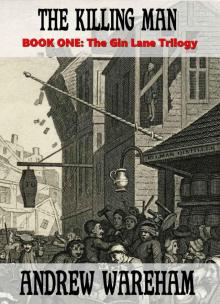 The Killing Man
The Killing Man Bold and Blooded
Bold and Blooded The Breaking Storm (Innocent No More Series, Book 2)
The Breaking Storm (Innocent No More Series, Book 2) Nobody’s Child
Nobody’s Child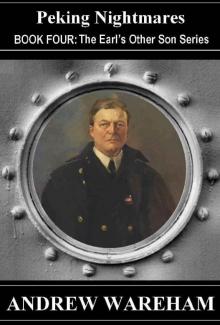 04 Peking Nightmares (The Earl’s Other Son Series, #4)
04 Peking Nightmares (The Earl’s Other Son Series, #4) Red Man
Red Man Foreign Mud
Foreign Mud The Gathering Clouds (Innocent No More Series, Book 1)
The Gathering Clouds (Innocent No More Series, Book 1) 06 A Soldier’s Farewell (Man of Conflict #6)
06 A Soldier’s Farewell (Man of Conflict #6) Chinese Whispers
Chinese Whispers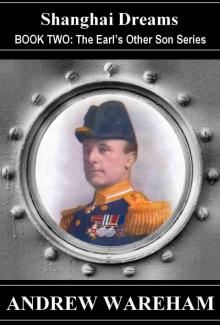 02 Shanghai Dreams (The Earl’s Other Son #2)
02 Shanghai Dreams (The Earl’s Other Son #2)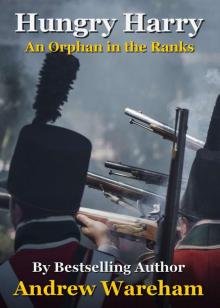 Hungry Harry: An Orphan in the Ranks
Hungry Harry: An Orphan in the Ranks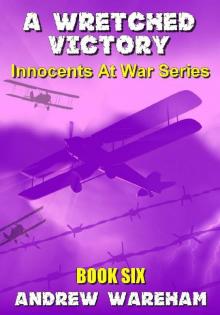 A Wretched Victory (Innocents At War Series, Book 6)
A Wretched Victory (Innocents At War Series, Book 6) Illusions Of Change (A Poor Man at the Gate Series Book 6)
Illusions Of Change (A Poor Man at the Gate Series Book 6) The Wages Of Virtue (A Poor Man at the Gate Series, Book 8)
The Wages Of Virtue (A Poor Man at the Gate Series, Book 8)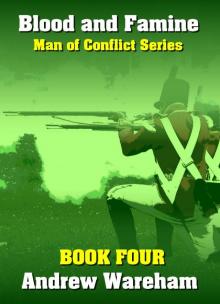 Blood and Famine (Man of Conflict Series, Book 4)
Blood and Famine (Man of Conflict Series, Book 4) The Friendly Sea (The Duty and Destiny Series, Book 1)
The Friendly Sea (The Duty and Destiny Series, Book 1)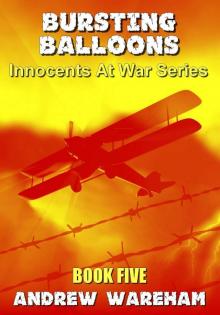 Bursting Balloons (Innocents At War Series, Book 5)
Bursting Balloons (Innocents At War Series, Book 5)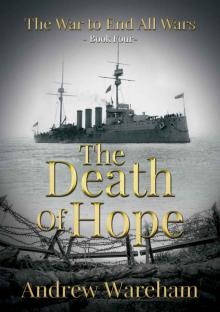 The Death of Hope
The Death of Hope Deadly Shores (The Duty and Destiny Series, Book 11)
Deadly Shores (The Duty and Destiny Series, Book 11) The Vice Of Virtue (A Poor Man At The Gate Series Book 10)
The Vice Of Virtue (A Poor Man At The Gate Series Book 10) Virtue’s Reward (A Poor Man at the Gate Series, Book 11)
Virtue’s Reward (A Poor Man at the Gate Series, Book 11)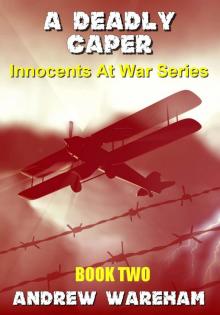 A Deadly Caper (Innocents At War Series, Book 2)
A Deadly Caper (Innocents At War Series, Book 2)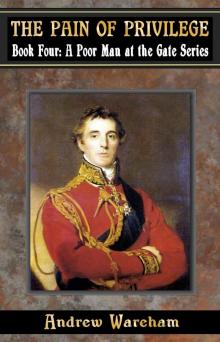 The Pain Of Privilege (A Poor Man at the Gate Series Book 4)
The Pain Of Privilege (A Poor Man at the Gate Series Book 4)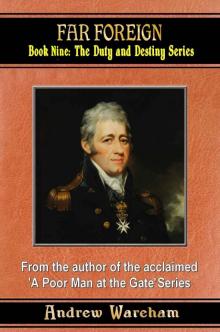 Far Foreign (The Duty and Destiny Series, Book 9)
Far Foreign (The Duty and Destiny Series, Book 9)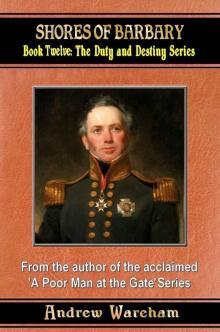 Shores of Barbary (The Duty and Destiny Series, Book 12)
Shores of Barbary (The Duty and Destiny Series, Book 12)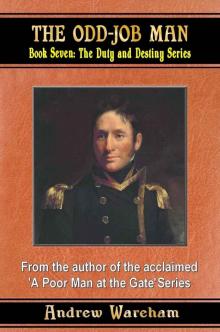 The Odd-Job Man (The Duty and Destiny Series, Book 7)
The Odd-Job Man (The Duty and Destiny Series, Book 7) Fire and Folly (Man of Conflict Series Book 3)
Fire and Folly (Man of Conflict Series Book 3) A Victorian Gent (The Making of a Man Series, Book 1)
A Victorian Gent (The Making of a Man Series, Book 1)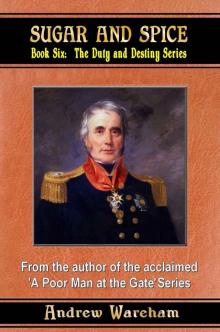 Sugar and Spice (The Duty and Destiny Series, Book 6)
Sugar and Spice (The Duty and Destiny Series, Book 6)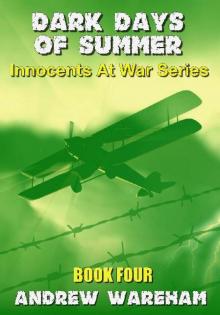 Dark Days Of Summer (Innocents At War Series, Book 4)
Dark Days Of Summer (Innocents At War Series, Book 4)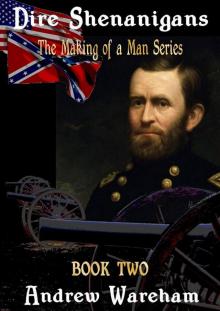 Dire Shenanigans (The Making of a Man Series, Book 2)
Dire Shenanigans (The Making of a Man Series, Book 2)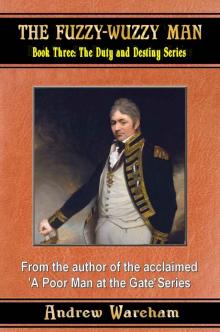 The Fuzzy-Wuzzy Man (The Duty and Destiny Series, Book 3)
The Fuzzy-Wuzzy Man (The Duty and Destiny Series, Book 3) Privilege Preserved (A Poor Man at the Gate Series Book 5)
Privilege Preserved (A Poor Man at the Gate Series Book 5)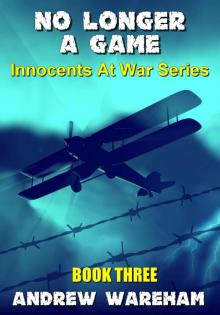 No Longer A Game (Innocents At War Series, Book 3)
No Longer A Game (Innocents At War Series, Book 3)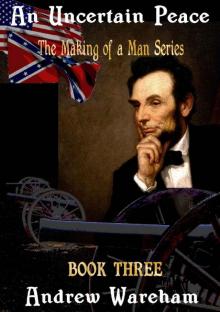 An Uncertain Peace (The Making of a Man Series, Book 3)
An Uncertain Peace (The Making of a Man Series, Book 3)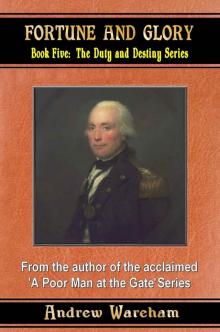 Fortune And Glory (The Duty and Destiny Series, Book 5)
Fortune And Glory (The Duty and Destiny Series, Book 5) The Old Order (A Poor Man at the Gate Series Book 7)
The Old Order (A Poor Man at the Gate Series Book 7) A Place Called Home (Cannibal Country Trilogy, Book 2)
A Place Called Home (Cannibal Country Trilogy, Book 2) Nouveau Riche (A Poor Man at the Gate Series, Book 2)
Nouveau Riche (A Poor Man at the Gate Series, Book 2) The Privateersman (A Poor Man at the Gate Series Book 1)
The Privateersman (A Poor Man at the Gate Series Book 1) Britannia’s Son (The Duty and Destiny Series, Book 4)
Britannia’s Son (The Duty and Destiny Series, Book 4) Long Way Place (Cannibal Country Trilogy, Book 1)
Long Way Place (Cannibal Country Trilogy, Book 1) Spanish Tricks (Man of Conflict Series, Book 5)
Spanish Tricks (Man of Conflict Series, Book 5) A Parade Of Virtue (A Poor Man At The Gate Series Book 9)
A Parade Of Virtue (A Poor Man At The Gate Series Book 9) A Busy Season (The Duty and Destiny Series, Book 8)
A Busy Season (The Duty and Destiny Series, Book 8) Billy Bacon and the Soldier Slaves (Colonial Warrior Series, Book 1)
Billy Bacon and the Soldier Slaves (Colonial Warrior Series, Book 1)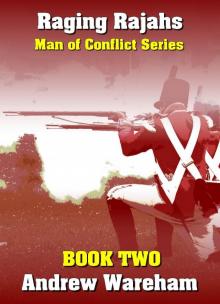 Raging Rajahs (Man of Conflict Series, Book 2)
Raging Rajahs (Man of Conflict Series, Book 2) Victorian Dawn (A Poor Man at the Gate Series, Book 12)
Victorian Dawn (A Poor Man at the Gate Series, Book 12) Born To Privilege (A Poor Man at the Gate Series Book 3)
Born To Privilege (A Poor Man at the Gate Series Book 3)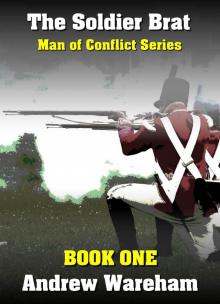 The Soldier Brat (Man of Conflict Series, Book 1)
The Soldier Brat (Man of Conflict Series, Book 1)